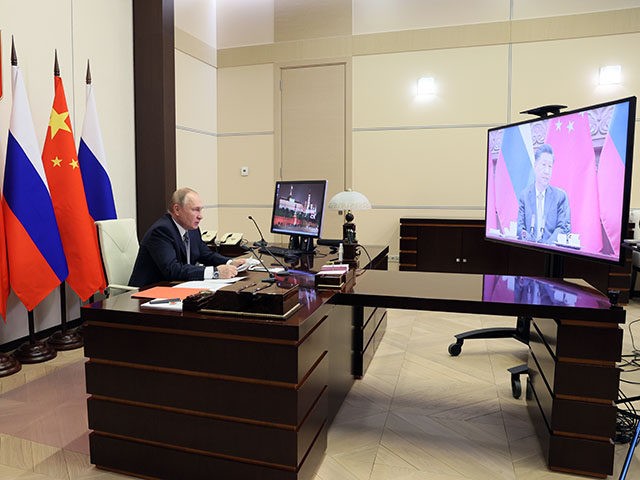Chinese dictator Xi Jinping and his Russian counterpart Vladimir Putin engaged in what both sides depicted as a warm, enthusiastic “virtual meeting” between two friends on Wednesday, prioritizing discussion of containing nefarious “third parties” who wish to harm their relationship.
Both the Chinese and Russian descriptions of the video call indicate that America was very much at the forefront of a discussion that reportedly included trade, cooperation at venues like the United Nations, bilateral support for their respective authoritarian systems, and assuming their “responsibilities as major countries.” Neither the Chinese Foreign Ministry nor Kremlin readouts of the call as published on Wednesday morning Eastern Time mentioned the United States, but Beijing in particular appeared preoccupied with the looming influence of Washington on both regimes’ agendas.
“Xi pointed out that certain forces in the world are trying to meddle in the internal affairs of China and Russia under the pretext of ‘democracy’ and ‘human rights’ and grossly trample on international law and universally recognized norms governing international relations,” according to the Chinese Foreign Ministry. “China and Russia need to launch more joint actions to uphold the security interests of the two sides more effectively.”
“China and Russia need to step up coordination and collaboration in international affairs, be more vocal on global governance, come up with feasible solutions to the pandemic, climate change and other global issues,” the Ministry statement continued, “and firmly uphold international fairness and justice in the process of resolving international and regional hotspots.”
“Efforts must be made to firmly reject hegemonic acts and the Cold War mentality under the disguise of ‘multilateralism’ and ‘rules,’” Xi reportedly asserted.
The complaint of abuse of “democracy” appeared to be a jab at President Joe Biden’s failed “Summit for Democracy,” an online conference featuring speakers from invited countries to discuss how to combat authoritarian attempts to undermine freedom. The White House itself appeared to partake in such an attempt during the conference, censoring an address by Taiwanese minister Audrey Tang after she displayed a map that showed the sovereign nation in a different color than China. While Biden administration officials claimed a “technical” error was responsible for the move, anonymous officials told Reuters that the White House cut the feed on purpose out of fear of offending China.
China was already offended, on itself and Russia’s behalf, for not being invited.
Elsewhere in the 2,100-word statement on Xi’s discussion with Putin, the Chinese Foreign Ministry replayed that Xi engaged in a defensive rant about the definition of “democracy” in defense of his regime, a totalitarian, violent institution currently engaging in genocide.
“Xi stressed that democracy is a lofty aspiration and common value of all humanity and also a right enjoyed by people of all countries,” the Ministry claimed. “Whether a country is democratic or not and how to better realize democracy can only be left to its own people to decide. International affairs should be managed by all countries through consultation.”
“Promoting greater democracy in international relations and upholding true multilateralism is the expectation of the people and the prevailing trend of the times,” the Ministry statement continued. “China will enhance communication and coordination with Russia to encourage the international community to take the right view on democracy and defend the legitimate democratic rights of all countries.”
The Kremlin readout was much shorter and included only a transcript of Putin’s initial remarks to Xi, though the statement ends with “to be continued.” In the excerpt published, Putin expressed “delight” at speaking to “dear friend” Xi and, to a much lesser extent than the Chinese interpretation of the conversation, focused on mutual enemies. Instead, Putin highlighted points of cooperation, including plans for Russia to build a nuclear power plant in China.
“A new model of cooperation has developed between our countries,” Putin said, according to the Kremlin. “A model based, in part, on the principles of non-interference in each other’s affairs and mutual resolve to turn our common border into a belt of eternal peace and good-neighbourliness.”
The Chinese government has at press time offered more details about Putin’s remarks than Moscow.
“Russia firmly rejects attempts to meddle in the internal affairs of Russia and China or to contain the legitimate development interests of the two countries,” the Chinese Foreign Ministry quoted Putin as saying. “It is committed to upholding international fairness and justice and to maintaining strategic security and stability in the world. Russia is ready for more communication with China on defending true democratic rights and interests of all countries.”
Xi also ceremonially invited Putin to the 2022 Beijing Winter Olympics — Putin had already reportedly accepted an invite in private — another jab at the United States, which received no such invitation for its officials.
Biden attempted to declare that America would engage in a “diplomatic boycott” of the Olympics this month in protest of the ongoing Chinese genocide of the Uyghur people and other human rights atrocities, but Beijing laughed off the declaration, noting that the officials “boycotting” were never invited to begin with.
A “diplomatic boycott” of the Olympics is not a boycott, as diplomats do not participate in Olympic sports, so their absence has no effect on the event.
The tenor of the Xi-Putin call differed markedly from Xi’s conversation with Biden in November. In that talk, which reportedly lasted hours, Xi threatened Biden to not support the government of Taiwan, asserting, “Such moves are extremely dangerous, just like playing with fire. Whoever plays with fire will get burnt.”
In contrast, Biden used the opportunity to urge Xi to agree to “common-sense guardrails” in the rivalry between the two countries to avoid war, according to the White House.

COMMENTS
Please let us know if you're having issues with commenting.